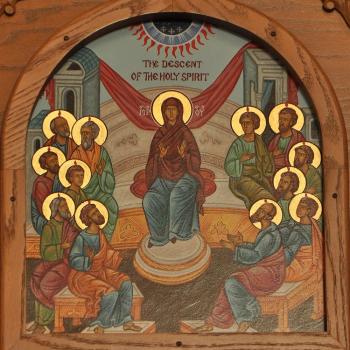
James warms us against deceiving ourselves by thinking that if we hear the truth and believe it, we don’t have anything else to do. “But be doers of the word, and not hearers only, deceiving yourselves” (Jas. 1:22 RSV). We deceive ourselves if we think we don’t have to put our faith into action. We can’t be said to be faithful if we ignore what is expected of us, what truth teaches us to do. Let us not be deceived. Let us not think salvation is cheap, that we need do nothing but believe without acting out on that belief. This is why Jesus, when asked what we should do, he didn’t say “just believe,” but rather, he said we should love:
“Teacher, which is the great commandment in the law?” And he said to him, “You shall love the Lord your God with all your heart, and with all your soul, and with all your mind. This is the great and first commandment. And a second is like it, You shall love your neighbor as yourself. On these two commandments depend all the law and the prophets” (Matt. 22:26-40 RSV).
If we love God, we will love what God loves, and so we will love our neighbor because God loves our neighbor. Such love should be natural to us, given out freely, so that we do not need to be told to love, but we are told to love to confirm that love so that we know that such love is approved by God and what God wants from us. We can say we love God all that we want, but if we do not embrace love and so love our neighbor as ourselves, our love for God is deficient. Truly, our love for God will show itself in the way we love our neighbor. We will keep the commandments, commandments which flow out of and follow the expectations of love, and when we do so, we will be comforted by the Spirit, the Spirit of love. For the Holy Spirit will join itself to us in and through our love, granting us such grace so as to perfect that love so that we will also find in that love the comfort and beatitude which is found in love itself. This is why, when we read Jesus said he would send us the Spirit to comfort us, it is connected to the expectation that we should love him and fulfill the commandments of love:
If you love me, you will keep my commandments. And I will pray the Father, and he will give you another Counselor, to be with you for ever, even the Spirit of truth, whom the world cannot receive, because it neither sees him nor knows him; you know him, for he dwells with you, and will be in you. I will not leave you desolate; I will come to you (Jn. 14:15-18 RSV).
If we die to the self so that we can embrace the path of love, we will not be left desolate. We must trust in Jesus and his word. Love, true self-giving love, is not easy. But we must realize we are being challenged to be more than hearers of the word, but its doers. Will we prove ourselves faithful and so love as we should? Or do we think that the faith is about an intellectual pursuit where we seek after propositional statements concerning the truth which we should believe? So long as we deceive ourselves and think the faith is about what propositions we hold onto and believe instead of a living faith which acts on what we have been told, we will not be filled with the Spirit and all the blessings which they Spirit can bring to us; rather, we will be like the living dead, going from place to place, intellectually trying to consume all the thoughts and ideas which come before us without, however, digesting them and so finding no spiritual sustenance from them. We must embrace what is taught, not just listen and think good ideas alone will suffice. Thus, we need, as St. Gregory of Sinai indicated, a “grace-imbued faith”:
Grace-imbued faith, energized by the Spirit through our keeping of the commandments, alone suffices for salvation, provided we sustain it and do not opt for a dead and ineffectual faith rather than for a living effective faith in Christ. To embody and give life to an effective faith in Christ is all we need to do as believers. But nowadays we who call ourselves orthodox believers have in our ignorance imbibed not the faith imbued with grace but a faith that is merely a matter of words, dead and unfeeling.[1]
If we think the faith is all about the ideas and the words which we can use to express those ideas, we have a dead faith, a faith of the letter and not of the Spirit. Believing in good words, good ideas, is not good enough. For we deceive ourselves in thinking we have faith if we do not put those words into action, if we do not heed what they imply and live out those implications in our daily lives.
Orthodoxy without orthopraxis is not orthodoxy, but rather, it is another false faith, another imitation of the truth. It does not possess the life giving Spirit and the grace of the kingdom of God. Only if we follow Jesus in love and embrace love will we find ourselves joined by the Spirit of Life, the Spirit of love, and receive with it the blessings of the kingdom of God. Where there is an orthopraxis which emerges out of orthodoxy, there is a living faith. We must embody the faith, act on it, put it into practice in the world, making sure our faith is living, for only then can we find salvation.
[1] St. Gregory of Sinai, “On Commandments and Doctrines, Warnings and Promises; on Thoughts, Passions and Virtues, and also on Stillness and Prayer: One Hundred and Thirty-Seven Texts” in The Philokalia. The Complete Text. Volume Four. Trans. G.E.H. Palmer, Philip Sherrard, Kallistos Ware, et. al. (London: Faber and Faber, 1995), 217 [#28].
Stay in touch! Like A Little Bit of Nothing on Facebook.
If you liked what you read, please consider sharing it with your friends and family!













